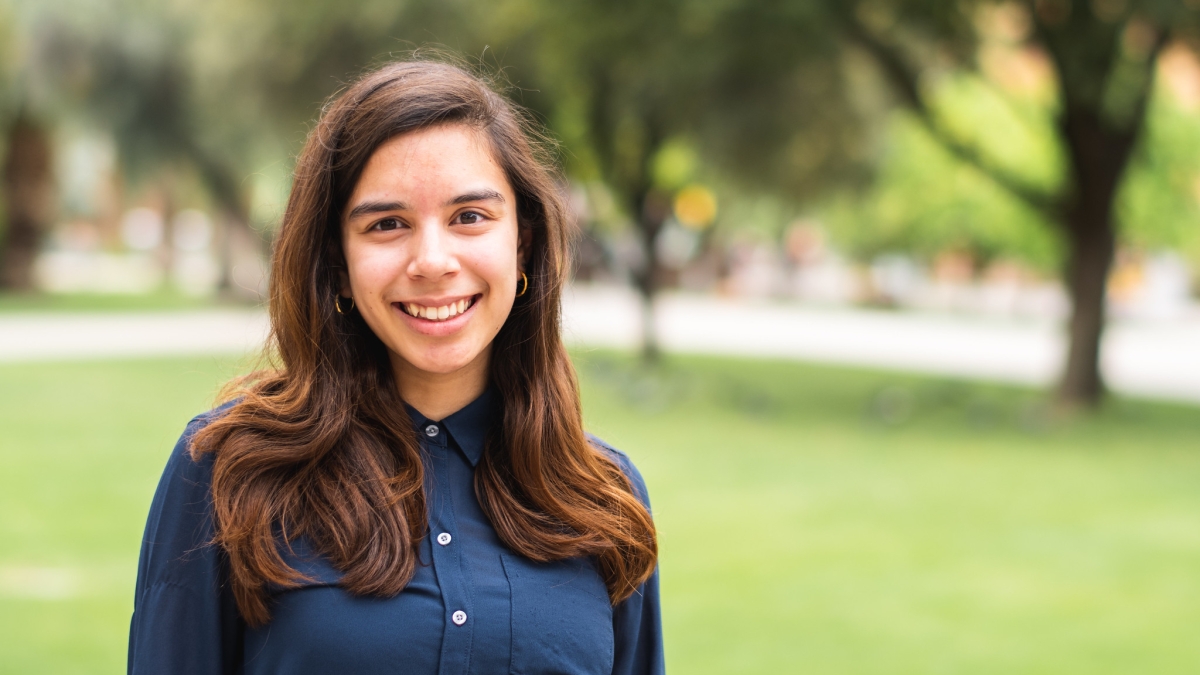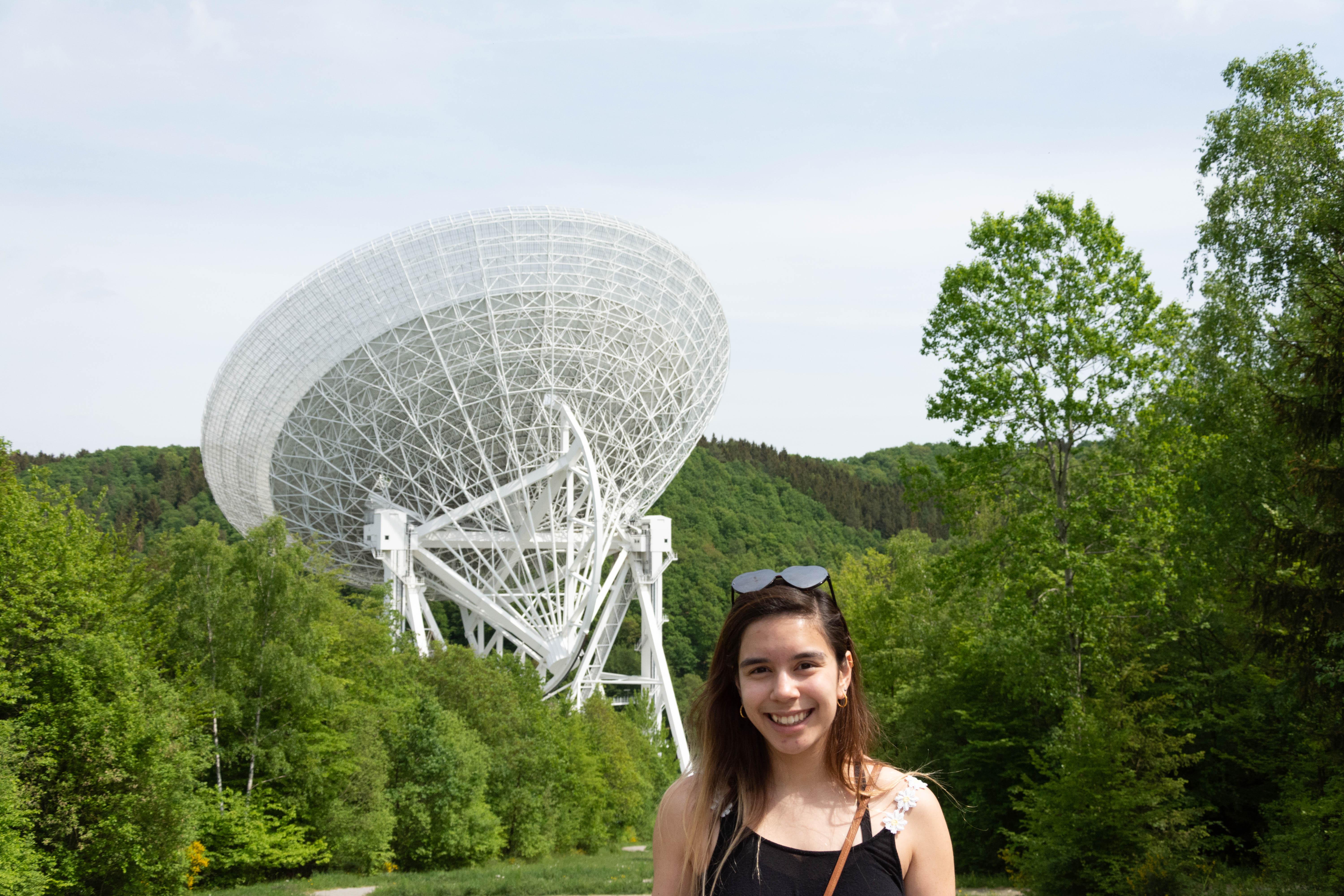Editor’s note: This is part of a series of profiles for spring 2019 commencement.
A high school class schedule snafu led Gabriela Huckabee to a scientific discipline that would become her passion.
Huckabee will graduate from Arizona State University on May 7 with a Bachelor of Science degree in astrophysics with honors from Barrett, The Honors College, and the Dean’s Medal from the School of Earth and Space Exploration. She completed her degree in three years.
“When I was in high school, I was placed into an astronomy class by accident. My adviser, who was supposed to make my schedule based on my preferences, gave me classes that I didn't request and refused to change my schedule because I wasn't a senior,” Huckabee said.
“I had always been interested in astronomy, because space is cool. I never thought of it as a career path because I had been led to believe that only engineers made money in today's economy. In that class, my teacher fanned the flames of my passion for astrophysics and physical sciences,” she said.
Huckabee came to ASU from Fairfax, Virginia, as a National Merit Scholar. She was a Sundial Physics Scholar and a mentor and facilitator for the program. She also was the recipient of a joint ASU-NASA Space Grant fellowship supporting undergraduate students working on research with faculty members. The ASU-NASA Space Grant funded Huckabee’s research on galaxy outflows and galactic magnetic fields.
She was a research assistant in ASU’s Cosmology Initiative, a partnership between the School of Earth and Space Exploration and the Department of Physics focusing on producing groundbreaking planetary and space research. In 2018, with the support of a National Science Foundation grant, she conducted research in Germany using a Low Frequency Array (LOFAR) to collect data. Her Barrett Honors College thesis, directed by Dr. Rolf Jansen, was based on LOFAR data to study magnetic fields.
“The biggest opportunity I had was the chance to be a part of Sundial, an inclusive community of physics and SESE students that starts out as an early start program and continues into the school year as a fall and spring semester class. The friends that I made there, with people in my academic year, upperclassmen, freshmen, grad students and faculty helped me feel like I belonged in my major and that I could succeed. I have a strong network that expanded to other universities through the Access Network that Sundial is a part of, and I have relied on that network for help and advice regarding research, grad school and personal support,” she said.
A thesis she did for SESE, titled “The Effect of Nonequilibrium Chemistry and Nonuniform Metallicity on Ion Abundances in Galaxy Outflow Hydrodynamic Simulations,” looked at simulations of galaxy outflows in the circumgalactic medium, a source for a galaxy's star-forming fuel.
"Gabby's work is an important contribution to understanding the dynamics of the circumgalactic medium, which is so critical to our understanding of how galaxies behave," said Joe Foy, honors faculty fellow who served as Huckabee’s thesis director. "She has done great work, and I look forward to seeing what exciting contributions she will make to the field in the future."
Gabriela Huckabee at the site of Low Frequency Array equipment in Effelsberg, Germany. Photo courtesy of Gabriela Huckabee
Huckabee’s future includes beginning a PhD in physics at the University of California, Santa Cruz this fall.
“I'm excited to do cosmology research!” she said.
We caught up with Huckabee to get her thoughts about her undergraduate experience at ASU.
Question: What was your “aha” moment, when you realized you wanted to study the field you majored in?
Answer: My high school astronomy teacher convinced me to go to an assembly where an astronaut would be speaking. Mike Massimino spoke to us about what his high school and college experience was like, and what it was like to work for NASA and fly aboard the International Space Station. After the presentation, I talked to him and my teacher, Mrs. Hennig, about potential future careers in astronomy. They both encouraged me to pursue astronomy if that was really something that I was interested in, and I have pursued astrophysics ever since.
Q: What is something you learned while at ASU — in the classroom or otherwise — that surprised you or that changed your perspective?
A: Math is a more powerful tool than people give it credit for. In high school I really didn't like math and I thought I was pretty bad at it. Through my physics classes, I developed a better appreciation for it.
Q: Why did you choose ASU?
A: ASU is very generous with its financial aid, and of all of the schools I had applied to, it was the most affordable for me. My reasons for choosing ASU weren't that exciting — I just needed to be able to afford tuition and the cost of living, and I wanted to see somewhere new. Ultimately, however, after I accepted admission, then visited the campus and saw the SESE program and spoke to some of the professors, I knew that I had made the right choice.
Q: Which professor taught you the most important lesson while at ASU?
A: Dr. Anna Zaniewski taught me that it is OK to fail. When encountering obstacles and setbacks, you learn and you improve, and in the end, things will work out if you keep trying. Teaching people to be resilient and to persevere in difficult times will allow them to grow.
Q: What is the best piece of advice you would give to those still in school?
A: Work in a group, start your homework two days before it's due instead of one and just go to class. Even if you feel like you're learning nothing, you pick up more when you're physically listening to a lesson than if you're still in bed watching Netflix.
Q: What was your favorite spot on campus, whether for studying, meeting friends or just thinking about life?
A: I really like the fifth floor of the Barry M. Goldwater Center for Science and Engineering, especially the office of the Cosmology Initiative group. My friends and I would do homework and research there, and I'd get to hang out with the grad students and researchers. They're a great community to be a part of! I also liked the third floor and above of the Interdisciplinary Science and Technology Building 4. The crater carpet is great for group projects and naps. Also, sometimes people in suits show up and get good food catered. They typically don't mind if undergrads snatch appetizers and brownies.
Q: If someone gave you $40 million to solve one problem on our planet, what would you tackle?
A: I don't know if $40 million would be enough to do this, but I'd try to improve universal access to a quality education. Everyone should have equal access to the same standard of education, regardless of income, gender, location, ethnicity (or) any other factor. By educating people, you create more problem-solvers with the intellectual resources they need to enact change.
More Science and technology

ASU professor breeds new tomato variety, the 'Desert Dew'
In an era defined by climate volatility and resource scarcity, researchers are developing crops that can survive — and thrive —…

Science meets play: ASU researcher makes developmental science hands-on for families
On a Friday morning at the Edna Vihel Arts Center in Tempe, toddlers dip paint brushes into bright colors, decorating paper…

ASU water polo player defends the goal — and our data
Marie Rudasics is the last line of defense.Six players advance across the pool with a single objective in mind: making sure that…



